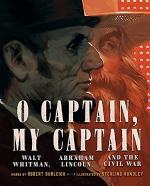
|
| Name: _________________________ | Period: ___________________ |
This test consists of 5 multiple choice questions, 5 short answer questions, and 5 short essay questions.
Multiple Choice Questions
1. By which other term, besides "Captain," does the speaker address the captain of the ship?
(a) Father.
(b) Brother.
(c) Master.
(d) Leader.
2. Which technique is evident in line 10, "Rise up—for you the flag is flung—for you the bugle trills"?
(a) Antimetabole.
(b) Antistrophe.
(c) Anaphora.
(d) Antithesis.
3. The list of ways the crowd is celebrating the arrival of the ship in lines 9-12 is an example of which technique?
(a) Understatement.
(b) Periphrasis.
(c) Accumulation.
(d) Paraprosdokian.
4. Which technique is evident in the phrase "for you the flag is flung" (line 10)?
(a) Sibilance.
(b) Cacophony.
(c) Assonance.
(d) Alliteration.
5. Which term describes the poem's repeated use of the phrases "O Captain! My Captain!" (lines 1 and 9) and "fallen cold and dead" (lines 8, 16, and 24)?
(a) Conceit.
(b) Chorus.
(c) Verse.
(d) Refrain.
Short Answer Questions
1. Which is the best interpretation of line 9, when the speaker urges "O Captain! my Captain! rise up and hear the bells"?
2. What is the most accurate way to describe the poem's stanza form?
3. Which details in the second stanza evoke a patriotic occasion?
4. What type of rhyme is employed in line 20, "From fearful trip the victor ship comes in with object won"?
5. Where is the ship in the beginning of the poem?
Short Essay Questions
1. What evidence is there that the speaker is struggling to understand and process the captain's death?
2. Explain the allegorical nature of the poem's central conceit.
3. What ironic contrast do the poem's images highlight?
4. Describe the form of "O Captain! My Captain!"
5. What elements of the poem's diction establish a warm and personal relationship between the speaker and the captain?
|
This section contains 668 words (approx. 3 pages at 300 words per page) |

|




